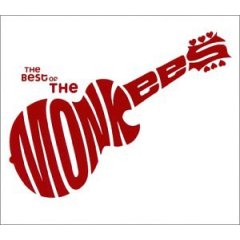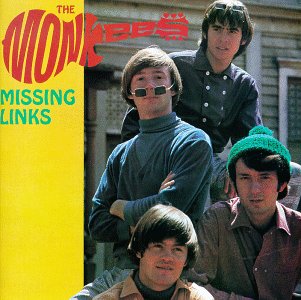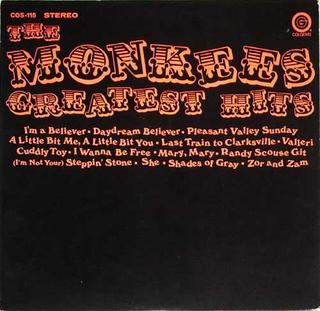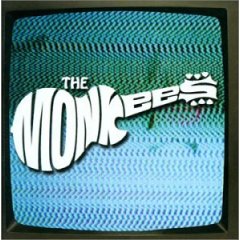
George Michael Dolenz Jr. is an American actor, musician, TV producer and businessman. He is best known as the vocalist and drummer for the 1960s pop-rock band the Monkees and a co-star of the TV series The Monkees (1966–1968). Following the death of Michael Nesmith in 2021, Dolenz is the only surviving member of the band.

Pisces, Aquarius, Capricorn & Jones Ltd. is the fourth album by the Monkees. It was released on November 6, 1967, when the Monkees were exerting more control over their music and had started to play many of the instruments themselves, something that their record company had previously forbidden. However, though the group had full control over the album, they invited more contributions from outside songwriters than on their previous album, Headquarters, and used session musicians to complement their sound. The album also featured some of the earliest uses of the Moog synthesizer in popular music. Pisces, Aquarius, Capricorn & Jones Ltd. sold more than three million copies and was also the band's fourth consecutive album to reach number one on the U.S. Billboard 200.

Headquarters is the third album issued by the Monkees and the first with substantial songwriting and instrumental performances by members of the group itself, rather than by session musicians and professional songwriters. After a struggle for creative autonomy with their record label, the group had been allowed, to a degree, to record by themselves. Headquarters reached No. 1 on the Billboard 200 chart and was certified double platinum in the United States with sales of more than two million copies within the first two months of release. It peaked at No. 2 on the UK charts. It is included in the 2006 book 1001 Albums You Must Hear Before You Die.

More of the Monkees is the second studio album by the American pop rock band the Monkees. It was recorded in late 1966 and released on Colgems label #102 on January 9, 1967. It displaced the band's debut album from the top of the Billboard 200 chart and remained at No.1 for 18 weeks—the longest of any Monkees album. Combined, the first two Monkees albums were at the top of the Billboard chart for 31 consecutive weeks. More of the Monkees also went to No.1 in the UK. In the U.S. it has been certified quintuple platinum by the RIAA with sales of more than five million copies. More of the Monkees is also notable for being the first pop/rock album to be the best-selling album of the year in the U.S.

The Monkees is the debut studio album by the band the Monkees. It was released in October 1966 by Colgems Records in the United States and RCA Victor in the rest of the world. It was the first of four consecutive U.S. number one albums for the group, taking the top spot on the Billboard 200 for 13 weeks, after which it was displaced by the band's second album. It also topped the UK charts in 1967. The Monkees has been certified quintuple platinum by the RIAA, with sales of over five million copies.

The Best of the Monkees is a Monkees compilation released by Rhino Entertainment. It contains 25 songs from the Monkees' repertoire, listed in chronological order by release date. Also included is a bonus karaoke CD with five tracks. Unlike previous Rhino compilations, this one does not include any material from the 1980s or 1990s reunions, focusing strictly on the band's 1960s output.

The Monkees Present is the Monkees' eighth album. It is the second Monkees album released after the departure of Peter Tork and the last to feature Michael Nesmith until 1996's Justus.

The Birds, the Bees & the Monkees is the fifth studio album by the Monkees. Released in April 1968, it was the first Monkees album not to reach Billboard's number one, peaking at No. 3 on the U.S. charts. It was also their first album to miss the UK charts altogether, with their four previous efforts all having reached the top ten. The album has sold over a million copies.

Head is the soundtrack to the film Head, the only theatrical release by the Monkees. Released in 1968 through Colgems, it was the band's sixth album. Head was the last Monkees album to feature vocal contributions by Peter Tork until Pool It! in 1987 and the last to feature all four Monkees until 1996's Justus.

Instant Replay is the seventh studio album by the Monkees. Issued 11 months after the cancellation of the group's NBC television series, it is also the first album released after Peter Tork left the group and the only album of the original nine studio albums that does not include any songs featured in the TV show.

More Greatest Hits of the Monkees is a 1982 greatest hits compilation album of songs by the Monkees, assembled and released by Arista Records. Rather than featuring strictly hit singles, the collection also featured music from their television series, which was still airing in syndication around the US.

Missing Links is a compilation album of rare and previously unreleased songs by the Monkees, issued by Rhino Records in 1987. It is the first volume of a three-volume set, followed by Missing Links Volume Two in 1990 and Missing Links Volume Three in 1996.

The Monkees Greatest Hits is the first greatest hits compilation album by the Monkees, issued by Colgems in June 1969.

Missing Links Volume Three is a compilation album of rare and previously unreleased songs by The Monkees, issued by Rhino Records in 1996. It is the third and final volume of a three-volume set, preceded by Missing Links in 1987 and Missing Links Volume Two in 1990.

Missing Links Volume Two is a compilation album of rare and previously unreleased songs by the Monkees, issued by Rhino Records in 1990. It is the second volume of a three-volume set, preceded by Missing Links in 1987 and followed by Missing Links Volume Three in 1996.

The Monkees Anthology is a two-CD compilation set by the Monkees issued in 1998, and is the first collection to include material from their most recent studio album at the time, Justus. It includes almost all the original singles and B-sides, as well as a TV rarity and one live track.

Monkeemania is a two-disc Monkees compilation released in 2011. It contains 57 of the Monkees' songs, including hit singles, B-sides, album tracks and rarities. Several of these songs were unreleased in the 1960s, but were eventually issued on the Monkees' Missing Links archival compilation albums.

The Monkees: Original Album Series is a CD set by The Monkees which includes the first five albums by The Monkees. The CD set was released in 2010 as a slipcased box set.

Monkeemania is a Monkees compilation released in Australia in 1979. It contains 40 of the Monkees' songs, including hit singles, B-sides, album tracks and three previously unreleased tracks: "Love to Love," "Steam Engine" and a live version of "Circle Sky."

Good Times! is the twelfth studio album by American pop rock band the Monkees. Produced mainly by Adam Schlesinger, the album was recorded to commemorate the band's 50th anniversary. It is the first Monkees studio album since Justus (1996), marking the longest gap between Monkees albums to date, and the first since the death of founding member Davy Jones. The album features surviving Monkees Micky Dolenz, Michael Nesmith, and Peter Tork, as well as a posthumous contribution from Jones. The album received generally positive reviews from music critics and reached number 14 on the Billboard 200, becoming the band's highest-charting album in 48 years.



















